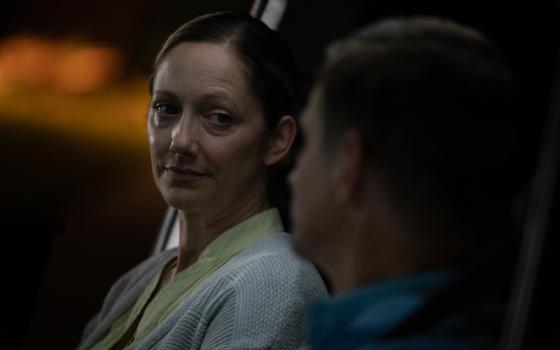The long-time director of the Survivors Network of those Abused by Priests has reached an out-of-court settlement related to allegations of sexual abuse by a Missouri diocesan priest first brought forward more than 25 years ago.
David Clohessy revealed in a press release Thursday that the Jefferson City, Mo., diocese in late August mailed him a check for $40,000 as part of an agreement refraining him from bringing further suits against the diocese regarding Fr. John Whiteley or other diocesan priests or staff.
The release that Clohessy signed as part of the agreement notes that the diocese and its components “choose voluntarily to settle fully and to extinguish all claims” brought by Clohessy, and “acknowledges that this settlement shall not be construed as an admission of liability or wrongdoing on the part of [the diocese].”
Clohessy alleges Whiteley molested him from age 12 to 16 while attending St. Pius X Church in Moberly, Mo., from 1969-73. The memories remained out of consciousness, he previously has said, until 1989 when he viewed the movie “Nuts,” in which the main character was sexually abused as a child.
In 1991, Clohessy attended his first SNAP meeting. That same year he filed suit against Whiteley and the Jefferson City diocese after unsuccessful efforts to confront the priest. The lawsuit was ultimately thrown out by the Missouri Supreme Court due to the expiration of the statute of limitations. Clohessy has said Whiteley also abused three of his brothers, including his younger brother Kevin, who became a priest and himself was accused in 2003 of sexual abuse.
In a statement, the Jefferson City diocese said that Whiteley has not exercised priestly ministry since it placed him on leave in 1991, and it is not aware of abuse allegations since that time.
Clohessy told NCR on Thursday he opted to pursue a settlement now in part due to the “small fortune” he has spent on therapy and because of an obligation he felt toward his family. He described his reaction to the settlement as “very mixed. Mostly grateful to have this process be over.”
In November 2014, Clohessy reached out to the diocese to say he wanted to talk about the effects of his alleged abuse. In January, Mike Berendzen of the child and youth protection office and Sr. Kathleen Wegman, met Clohessy at his St. Louis home. Clohessy said he never requested to meet with Bishop John Gaydos, who wrote him a letter “to extend to him an apology for the abuse that he reported,” the diocesan statement said.
During the meeting, he asked the diocese for $200,000 for medical and therapy expenses. In addition, he requested the diocese implement numerous measures aimed at preventing clergy sexual abuse of children, including:
- posting on its website the names of credibly accused diocesan priests;
- placing notices in parish bulletins and making announcements at Masses about the accusations against Whiteley;
- and similarly informing people in Florida where Whiteley is believed to be currently residing.
According to Clohessy, those suggestions “were never taken seriously,” and no conversation on the merits or obstacles to the measures occurred during his meeting with diocesan staff or in subsequent emails. While he credited Berendzen with responding to his initial email, Clohessy expressed disbelief that the diocese didn’t initiate the outreach.
“I don’t want to sound ungrateful, but it is frustrating that the onus for prevention, justice and healing still seems to virtually always fall on the victims,” he said.
Deacon Dan Joyce, communications director for the Jefferson City diocese, said that “unless people self-report, we don’t know who to work with,” adding that Clohessy’s case was an example of how they proceed once an alleged abuse victim contacts them.
“The only outreach we can do is provide a welcoming environment, and provide a contact, in any case that people should come forward, both to law enforcement as well as to our diocesan representative, and that’s what we’ve done,” Joyce said.
As for the prevention measures, Joyce said when an allegation is found credible the diocese informs the parish communities where the priest was assigned, both through announcements at Mass and bulletin placements, in addition to reporting to law enforcement. In the case of Whiteley, he said they have not had an active case to put through that process, but that Clohessy’s case in the early 1990s case got “heavy media play” in the area.
“I want to make that clear that this was not just a private matter. This was a highly litigated case that had high publicity at the time, at the time that people were paying attention to that particular case and that priest,” Joyce said.
Clohessy is not the first SNAP leader to receive a financial settlement. In 1995, SNAP founder Barbara Blaine received an $80,000 settlement from the Toledo, Ohio, diocese and the Oblates of St. Francis. While most abuse survivors receive nothing, Clohessy said, every acknowledgement of suffering, no matter how large or voluntary, is helpful.
“Am I magically healed? Of course not, but I didn’t expect to be and none of us do,” he said.
As for his own case, Clohessy didn’t see in it particular significance for the broader SNAP and abuse survivors communities, saying only “If one victim hears about this and breaks her silence and seeks help, that will make me very happy.”
[Brian Roewe is an NCR staff writer. His email address is broewe@ncronline.org. Follow him on Twitter: @BrianRoewe.]


